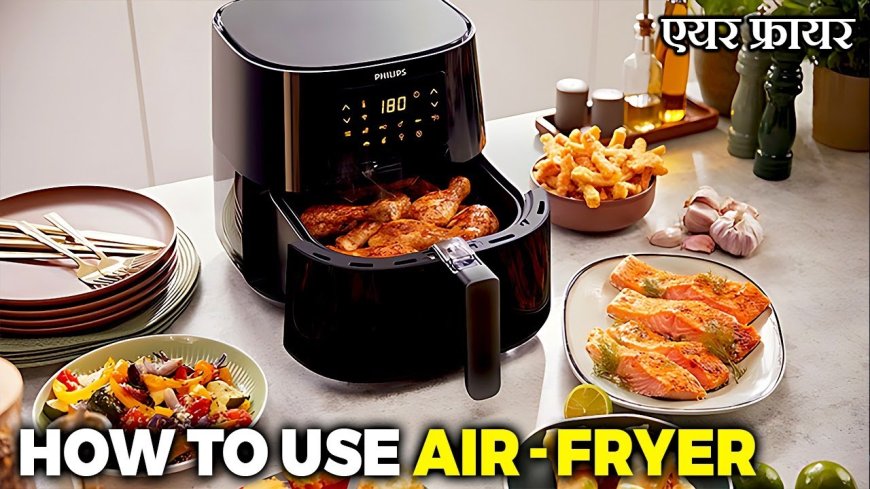Air Fryer - How to Use and Benefits

Air Fryer :
An air fryer is a kitchen appliance that uses hot air circulation to cook food, giving it a crispy texture similar to deep-frying but with significantly less oil. It's a popular alternative for those who want to enjoy fried foods with fewer calories and less grease.
The basic working principle of an air fryer involves the use of a heating element and a powerful fan. The heating element produces intense heat, while the fan circulates the hot air around the food at high speed. This circulating hot air quickly cooks the food and creates a crispy outer layer.
How to use an Air fryer :
Here's a step-by-step guide on how to use an air fryer:
-
Preheat the air fryer: Most air fryers have a preheat setting, so it's recommended to preheat the appliance for a few minutes before cooking.
-
Prepare the food: Season or marinate your food as desired. You can cook a variety of foods in an air fryer, including vegetables, meats, seafood, and even baked goods like cookies or pastries.
-
Place the food in the fryer basket: Depending on the size of your air fryer, you may need to cook food in batches to avoid overcrowding, which can lead to uneven cooking.
-
Set the temperature and time: Consult the recipe or cooking guidelines for recommended temperature and time settings. Most air fryers have adjustable temperature and timer controls.
-
Start the cooking process: Once you've set the desired temperature and time, start the air fryer. The hot air will circulate around the food, cooking it evenly.
-
Shake or flip the food: Depending on the recipe or food item, you may need to shake the fryer basket or flip the food halfway through the cooking process to ensure even browning.
-
Check for doneness: As the cooking time nears completion, check the food for doneness. You can use a meat thermometer to ensure meat is cooked to the desired internal temperature.
-
Remove and serve: Once the food is cooked to your liking, carefully remove it from the air fryer. Be cautious as the fryer basket and food may be hot. Allow the food to cool slightly before serving.
Benefits of an Air fryer :
Air fryers offer several benefits that have contributed to their popularity among home cooks. Here are some of the key benefits of using an air fryer:
-
Healthier cooking: One of the primary advantages of air fryers is that they require significantly less oil compared to traditional deep frying. By using hot air circulation, air fryers can achieve a crispy texture with just a fraction of the oil required for deep frying. This reduces the overall calorie and fat content of the food, making it a healthier cooking method.
-
Reduced oil consumption: Since air fryers require less oil, they can help you reduce your oil consumption. This is beneficial for individuals who are conscious of their fat intake or following a specific dietary plan.
-
Versatility: Air fryers are versatile appliances that can cook a wide range of foods. You can use them to fry, roast, grill, bake, or even reheat leftovers. From crispy fries and chicken wings to roasted vegetables and baked goods, an air fryer can handle various recipes and cooking techniques.
-
Time-saving: Air fryers generally cook food faster than conventional ovens. The hot circulating air allows for quick and even cooking, reducing the overall cooking time. This can be particularly useful for busy individuals or those who want to prepare meals quickly.
-
Easy to use: Air fryers are relatively easy to operate, making them accessible to home cooks of all skill levels. Most models come with adjustable temperature and timer settings, and many have pre-programmed cooking functions for different types of food. This simplifies the cooking process and ensures consistent results.
-
Easy cleanup: Air fryers are typically easy to clean. Many models have non-stick cooking surfaces, and some parts, such as the fryer basket and tray, are dishwasher-safe. The reduced use of oil also means less greasy residue to clean up compared to traditional frying methods.
-
Energy-efficient: Air fryers generally require less energy to operate compared to conventional ovens or stovetop cooking. They heat up quickly and don't require preheating for long periods, helping to save energy and reduce electricity consumption.
What's Your Reaction?


























































